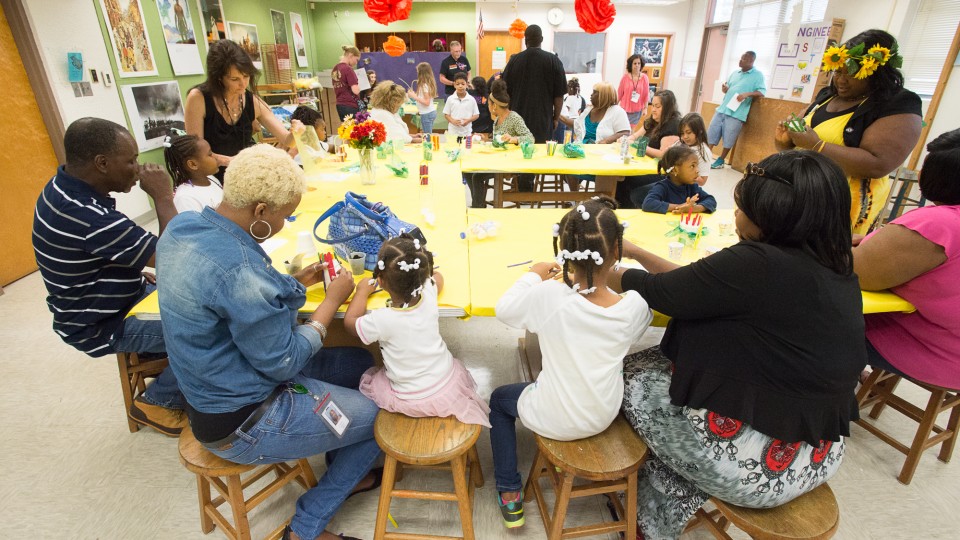Children do better when parents are involved
- October 2, 2017
- / Reggie Dogan
- / studer-community-institute,early-learning

Parents and students take part in family literacy night at Lincoln Park Primary School in
Pensacola, Fl. Thursday, April 23, 2015. (Michael Spooneybarger/ Pensacola Today)
The relationship children have with their parents and other caregivers is vital to early childhood development.
Parent involvement, in fact, is the number one predictor of early literacy success and future academic achievement. That’s why experts in education insist that the home is the first school and parents are the first teachers.
Through informative and educational outreach programs, innovative brain development projects and integration of early learning in the environment, the Studer Community is taking steps to offer parents support to develop tools and devise strategies to help their children reach developmental milestones.
Weekly parent sessions at Area Housing campuses and LENA Start classes at child development centers are examples of how we work to engage and involve parents in developing their babies’ brains and getting their children ready for kindergarten.
Research shows that kindergarten readiness is among the most important measures of a child’s academic progress. Children who are behind in kindergarten are more likely to be behind in third-grade reading, and they rarely catch up throughout their school careers.
We know that parent involvement in early literacy is directly connected to academic achievement. Children need parents to be their reading role models with daily practice in order to navigate successfully through beginning literacy skills.
Most parents want to be involved and engaged in their child’s learning, and many are able to establish and maintain ongoing and productive interaction with their children on a regular basis.
Some families, however, must deal with challenging circumstances, such as financial difficulties, separation and divorce, health issues, and language and cultural differences that complicate their ability to help their child succeed in school.
A part of LENA Start focuses on shared reading. Each week parents receive a new book, and LENA Corp. sends weekly text messages to find out how many minutes parents are reading with their babies.
The ideal goal is to read at least 10 minutes a day to 1-year-olds, 20 minutes to 2-year-olds and 30 minutes to 3-year-olds. Reading not only builds the brains of babies but also builds a strong relationship between the child and parent.
According to research, parents should focus on the words on the page while reading with their pre-K reader. Studies consistently show that children who don’t get enough verbal communication and positive interaction with parents are put at a disadvantage before they ever step in a classroom.
Research also indicates that both quantity and quality of language are essential for vocabulary development, which is an indicator of third-grade reading proficiency. Children who can’t read to learn by the end of third grade are four times likely to drop out of high school.
Our objective is to offer parents support and positive reinforcement as they strive to become their child’s first and most important teacher.
Building parent involvement is the single most important thing that parent groups do. Often, it’s the most difficult, too. And that’s too bad because there are many compelling reasons why parents—all parents—should get involved in their children’s education.
Researchers have been studying the effects parent attitudes and actions have on their children’s academic success for more than 30 years.
The results have been consistent. Anne Henderson and Nancy Berla summed it up in their book, A New Generation of Evidence: The Family Is Critical to Student Achievement”, which reviewed the existing research: “When parents are involved in their children’s education at home, they do better in school. And when parents are involved in school, children go farther in school and the schools they go to are better.”
But even more important is educating parents to read and talk to their children every day from birth so that they come to school ready to learn.
Nearly 85 percent of the brain is fully developed by age 3, and we believe parents, as a child’s first teacher, have the power and potential to impact and improve brain development in their children.
No matter if the first day of school is a few years away or right around the corner, there are so many ways that you, as parents and caregivers, can help your child with early brain development and kindergarten readiness.
 CivicCon launches with a look at good growth in cities
CivicCon launches with a look at good growth in cities
 Building stronger brains one baby, one parent at a time
Building stronger brains one baby, one parent at a time
 SCI debuts commercial on Early Learning City
SCI debuts commercial on Early Learning City
 Entrecon: World class speakers and an opportunity to sharpen skills
Entrecon: World class speakers and an opportunity to sharpen skills
 PYP Quality of Life survey 2017
PYP Quality of Life survey 2017
 EntreCon Pensacola 2016: A look back
EntreCon Pensacola 2016: A look back
 Leadership tip: getting better employee takeaways
Leadership tip: getting better employee takeaways
 Leadership tip: be interested instead of interesting
Leadership tip: be interested instead of interesting
 Leadership tip: delivering difficult messages
Leadership tip: delivering difficult messages
 Brain Bags boost Arc, Early Childhood Court programs
Brain Bags boost Arc, Early Childhood Court programs